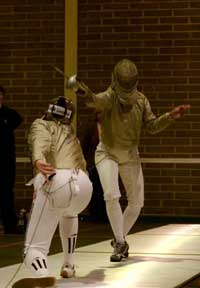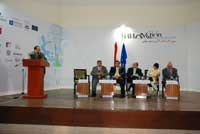A scientific mind Inspire article
Lucy Patterson talks to Yasemin Koc from the British Council about scientific thinking as a versatile tool for life.

Image courtesy of
Yasemin Koc
“The beauty of science is that it can be applied to any field,” explains Yasemin Koc, a young scientist with a wealth of varied career experience behind her. “It teaches a certain analytical way of thinking. A problem is broken down into pieces and examined from a number of different angles. It helps you to understand certain things better. It can be a tool, like another language.” It’s a tool that Yasemin has put to very good use, through her undergraduate and PhD studies, as a business analyst for the international bank JP Morgan, and now as the advisor for science communication and innovation to the British Council, based in London, UK.
The foundation for Yasemin’s interest in science was laid in school. “I became interested in chemistry at grammar school when our teacher told us that he would be collecting our notebooks to rate them. I panicked and ended up rewriting the whole thing. By the end I understood so much that I got full marks in all my chemistry exams.

Nuremberg, Germany
Image courtesy of bcphotobiz
/ iStockphoto
“In addition to chemistry, volleyball was my big passion (I had played for several different teams in Schwaig near Nürnberg, Germany), and it definitely helped that the coach was my chemistry teacher!”
Yasemin feels like a European: she was born in Nuremberg, has a German passport, and went to school in the area. When she was 18, however, her family, of Turkish roots, moved to Istanbul where she graduated from a German school two years later.

and Big Ben at night,
London, UK
Image courtesy of
compassandcamera /
iStockphoto
The first of her passions then took her to the Vienna University of Technologyw1, Austria, to study physical and analytical chemistry, and across the Atlantic for a master’s degree at MITw2 in Boston, USA, analysing synthetic spider silk in a materials lab. Her next stop was London, UK, where she did a five-year PhD in nanotechnology at Imperial Collegew3 (to take nanotechnology to the classroom, see Harrison, 2006, and Mallmann, 2008). “At the time, in 2003, nanotechnology was the hottest science field to enter. I contacted professor Andreas Manz, a pioneer in the field, and started my project in his lab soon after.”
Yasemin developed a diagnostic tool, the top-secret details of which are now patented by the American company that funded her research (Benninger et al., 2006). The handheld device (similar to an airport metal detector) uses microfluidics nanotechnology to detect a disease in the saliva of an infected person: the person being tested spits on the device, which returns a result in less than one minute.
After completing her PhD, Yasemin decided to change tack a little, becoming a business analyst for JP Morganw4. There, she used her problem-solving skills as a scientist to analyse businesses – how they are organised, how they communicate and how they handle data – and tried to find ways to make them more efficient. “Banks love taking on scientists since they have the ability to think analytically. You present them with a problem, they divide it into its individual components, investigate where the problem might lie, and find an efficient solution.”
One year later, Yasemin was again ready for a new challenge. Her current job is the advisor for science communication and innovation to the British Councilw5, an international cultural relations organisation promoting British culture and education opportunities globally. As part of the science team, Yasemin works on several programmes designed to build collaborations with and between scientists, and to encourage discussion and exchange between science and society.

right) as a panel speaker on
the Arab science and
technology strategy at a
conference in Cairo, Egypt
Image courtesy of Yasemin Koc
“I find my job immensely inspiring, as its main purpose is to connect: we connect the scientists with each other, scientists with policymakers, scientists with society. We want to enable scientists to make a real change.”
How does Yasemin spend a typical day? This turned out to be a question that she happily found somewhat difficult to answer: “A day-to-day description of my job would be difficult because it varies so much – which is basically what makes my job so amazing! One day I might attend a meeting with the Royal Societyw6 to discuss a series of science policy seminars we are planning to run. For example, at the moment I am working with our South African offices on a science policy seminar discussing food, bringing together scientists, policy makers, students and people from the street to discuss the issues of food in modern times.
“Last week I had a meeting with the Norwegian Academy of Sciences and Lettersw7 about our round of debates on the relationship between science and society, bringing together politicians from Norway and the UK, scientists and other critical minds. A few weeks ago, I attended a breakfast meeting at the House of Lords [the upper house of the British parliament] on nanotechnology.
“The situations I experience in this job can be just mind-blowing. I meet science ministers, members of Parliament, famous researchers, famous thinkers, journalists…but the most exciting part of my work is creating the connection between scientists and non-scientists by understanding the scientific world.”
Could this be something for you, too? Here’s Yasemin’s recommendation if you’re interested in a job like hers: “Anyone who has done a scientific degree and believes in the connection of science and other disciplines should apply for a job like this!”
References
- Benninger RKP et al. (2006) Quantitative 3D mapping of fluidic temperatures within microchannel networks using fluorescence lifetime imaging. Analytical Chemistry 78: 2272–2278. doi: 10.1021/ac051990f
- Harrison T (2006) Review of Nano: the Next Dimension and Nanotechnology. Science in School 1: 86. www.scienceinschool.org/2006/issue1/nano
- Mallmann M (2008) Nanotechnology in school. Science in School 10: 70-75. www.scienceinschool.org/2008/issue10/nanotechnology
Web References
- w1 – To learn more about the Vienna University of Technology (Technische Universität Wien), see: www.tuwien.ac.at
- w2 – For more information on the Massachussetts Institute of Technology (MIT), see: http://web.mit.edu
- w3 – You can find out more about Imperial College London on their website: www3.imperial.ac.uk
- w4 – To find out more about JP Morgan, see: www.jpmorgan.com
- w5 – Learn more about the British Council, including information and help for teachers interested in including an international perspective in their class or school: www.britishcouncil.org
- w6 – The Royal Society is the UK’s national academy of science. See: www.royalsoc.ac.uk
- w7 – To learn more about the Norwegian Academy of Sciences and Letters (Norske Videnskaps-Akademi), see: www.dnva.no
Review
Why should young people pursue a career in science? Is a scientific mind useful in management? How can a scientific career help a career in business?
Too few school students consider studying science – most think that science studies are difficult and that, at the end, there would be few career opportunities. However, “The beauty of science is that it can be applied to any field” are Yasemin Koc’s magic words – words that might motivate students to enter science.
Alessandro Iscra, Italy





